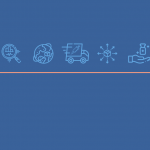Summary
• Country-wide disruption in learning has impacted teachers as much as any other stakeholder in the education ecosystem. Teachers now face the herculean task of assessing and bridging learning gaps caused by school closures.
• The education response thus far has been largely topdown where teachers have not been consulted or included in the decision-making processes.
• Beyond notifications and decisions on compliance of SOPs, there has been minimal training and preparation for teachers to be able to manage an effective return to schools.
• Pakistan faces a serious challenge as chronic pre-Covid learning losses will be compounded with intermittent school closure and limited efficacy of online learning models.
• Teachers have a central role to play in efforts towards ensuring learning continuity and wellness of students, and require support to navigate complexities created by the pandemic.
• Policymakers should take steps to ensure a participatory decision-making process, invest in teacher training and readiness beyond compliance of SOPs, develop guidelines to manage school reopening and explore avenues to improve digital access for teachers.
Identifying the Problem
Efforts to contain the global health crisis caused by Covid-19 have resulted in a worsening of the learning crisis for students. Like most countries, Pakistan’s education system also faced an extreme disruption. Country-wide closure of all schools and educational institutions was instituted in March 2020 to contain the first wave. Schools reopened in mid-September 2020 for barely eight weeks and were closed again due to the second wave in November 2020. After another disruption of nearly two months, education institutes are reopening again. While issues faced by students in wake of the pandemic and challenges of distance learning have received attention, teachers and their struggles with the pandemic also merit due focus.
Ministry of Federal Education and Professional Training (MoFEPT) and provincial education departments managed the education response to Covid-19 largely through a national consensus. A number of remedial actions were agreed and implemented to manage the administrative, educational, social and wellness impact of school closures. Some key decisions include cancellation and postponement of examinations, adjustment of learning objectives for the year 2020-2021, launch of distance learning tools, reduced attendance in schools and formulation of SOPs for reopening. While all these efforts are noteworthy, the learning loss incurred during Covid-19 will have to be understood and tackled effectively with urgency. While students, parents, administrators and other stakeholders are important in overcoming these losses, the central role of teachers in this process cannot be underestimated. As one of the most important stakeholders in the learning continuity journey, their participation, preparedness and motivation will be key to avoiding a disastrous setback in education outcomes.
Why Does the Problem Exist
Non-Participatory Decision Making
The education response to Covid-19 has been deliberated and planned with the federal ministry and provincial departments coordinating amongst each other, with provinces responsible for internal coordination and deliberation within their service delivery chains. At a provincial level, the decisions taken thus far have not involved teachers in the design or planning of education response with regards to closures, curriculum, reopening, remedial learning or SOPs. The missing inputs from these central stakeholders is essential to be able to design policies and procedures that have ownership and reflect ground realities with regards to resources, capacity, opportunities, challenges and risks.
Teacher Orientation and Training
The distortion and disruption in the education and learning spheres is massive. Learning losses are inevitable and multiple cycles of school closure and opening will have periodic distortions. School opening will have to carefully managed to ensure safety and learning as compliance with SOPs will have administrative and learning implications. Focus on active components of remedial learning, adjusted curricula and pedagogy, and acceptance and mainstreaming of blended learning models using technology will also have to be gradually incorporated. The impact of the Covid-19, social isolation and diseases/ bereavement although outside schools will have an impact on the mental wellness and learning capacity of students. It is essential that teachers are oriented and trained to tackle the complex yet necessary return to schools.
So far, the focus on teacher training has been minimal with notifications and plans shared only days in advance. Teacher readiness to implement SOPs rigorously has received some attention by education departments but there has been no serious effort in enabling teachers to estimate learning loss, understand the adaptive and remedial learning frameworks, adapt pedagogical approaches to support distance/blended learning or focus on student support. In some instances, mental health has been added to training modules but has not been mainstreamed fully. With the exception of a few private institutions, teachers were not provided any assistance on how to deliver distance learning: be it any technical training on using video conferencing solutions, instructional methodology, transforming content into remote learning formats, student engagement techniques or mechanisms for peer-learning.
Digital Access for Teachers
Challenges of limited digital access in Pakistan extend to teachers and students alike. Lack of access to dependable internet connections and ownership of electronic devices such as laptops/ tablets/ smartphones is a major impediment to distance learning and engagement. Besides the inevitable logistical challenges, teachers were also unfamiliar with remote learning solutions, and many found it difficult to adapt their teaching methods and materials using suitable online learning tools [i]. Even before the pandemic hit Pakistan, a 2018 study [ii] on ICT adoption in secondary schools across the country demonstrated that teachers felt that they lacked the time to take up or explore ICT integration, many lacked awareness of such solutions, while others felt that their teaching methods were sufficient and did not require any digital add-ons.
Personal Factors and Conditions
Uncertainty around school closures, shocks due to economic conditions and health implications especially for households with at-risk members, coronavirus infections and bereavements affect teachers as much as other members of the society. The education response and expectations from teachers should take into consideration responsibilities and personal factors especially for female teachers who would have the additional burden of domestic responsibilities and childcare during these challenging circumstances.
Similarly, some teachers may fall under the high-risk category, due to vulnerable family members who cannot be exposed to external environments, requiring special allowances to avoid in-person presence. While the government did issue ‘Health Guidelines for Education Institutions Reopening during COVID 19 Pandemic’ in September 2020, [iii] teachers have not received any direct training on managing challenges around compliance of SOPs, which further exacerbates the uneasiness many teachers feel about their preparedness to return to in person teaching.
In many low-cost private schools, troubles with fee-recovery led to many teachers being put on ‘unpaid leave’ or reduced salary as classes were suspended [iv]. The ensuing struggles during the pandemic have resulted in uncertainty, exhaustion and a lack of motivation amongst teachers, who foresee themselves having to provide remedial classes in addition to covering the regular academic requirements. In some private schools, teachers have been asked to switch to online learning without any facilitation by schools to cover connectivity and device costs.
Importance and Implications
The role of teachers is central to remedying the effects of disruptions in learning. Learning loss estimates from the 2005 earthquake when education was disrupted at a smaller scale and severity point towards students being 1.5 – 2 years behind those students in unaffected areas. It has been estimated that learning losses can translate into a 15% drop in adult lifetime earnings [v]. Teachers will have to be at the forefront in efforts to restore learning as Pakistan risks economic costs of approximately USD 155 billion, projected 20 years into the future (World Bank) [vi].
Teachers can also help in ensuring social gaps do not widen for children under their care, given the lack of learning support available at home. This is due to various factors like being first generation learners (with parents lacking foundational numeracy or literacy), or parents busy with making financial ends meet for the household. Learning profiles in developing nations such as Pakistan are already flat, demonstrating that the learning gains made by children on average per school grade, diminish. The losses to learning post pandemic are likely to accumulate when children return to school, as they will have to race through the current curriculum and catch-up with prior content missed during closures (compounding the problems of the mismatch between curricula and actual student ability) [vii].
If we are to finally embrace digital learning as a long-term solution (and not just an interim measure), an overhaul of the education system is required. Teachers, as frontline service delivery agents and enablers of learning, have insights at a granular level into their communities, cultural mores and the challenges in this transition. School closures and re-openings will be a dynamic constant spanning multiple school years until a large-scale vaccination programme is in place. Teachers cannot deliver on an adjusted learning framework and remedial measures if solutions are not tailored to local context. The motivation and buy-in of teachers will not be ensured unless they contribute to the design and implementation of response measures. Innovation at the local level can play a key role in evolution of teaching practices, soliciting community support and managing compliance with SOPs
Recommendations
1
Participation of Teachers in the Education Response Design
It is crucial for teachers to be involved in planning and reopening of education institutions. This will help allay their own fears and risk perceptions, contribute to robust design and secure buy-in for improved motivation and commitment to execution. Safe spaces where dialogue between government and teachers can take place need to be created, and the concerns and recommendations of teachers should be taken into account. As primary stakeholders in the education ecosystem, teachers can serve a greater role beyond knowledge delivery by contributing to the socio-emotional support and development to mitigate long-term impact of the pandemic. Teachers associations can prove to be useful platforms for engagement, inputs and assigning collective responsibility for an improved education response to learning continuity
2
Training, Skill Building and Support for Teachers
The onus of devising the strategy, methods and tools to deliver adjusted and remedial learning is placed entirely on teachers. The disrupted education cycle necessitates pedagogical interventions which utilize tailored approaches to engagement and learning. In order for this to materialize, capacity of teachers will need to be significantly enhanced through training and development that enables them to deal with in and out-of-class situations. Structured and mandatory teacher training programmes will need to be developed and implemented that focus on the active components of pedagogy and learning, managing return of students from school closures and assessing students. Teachers may also require upskilling to deal with blended and online learning tools and including digital literacy components in training programmes can help improve their participation in enabling students and parents in adopting such methods.
Creation of teacher peer-groups can help create a support mechanism where teachers can connect and engage in a semi-structured environment. These groups can serve as a means to share knowledge, seek support, iterate and experiment with adaptive learning. The role of parent-teacher associations and school management committees can be reinvigorated by more active participation by teachers in agenda-setting and seeking communal inputs to resolve local challenges.
3
Guidelines and Instruments for School Reopening
Detailed guidelines should be prepared to enable teachers in understanding expectations from them, offering tools and instruments that can be used to assess learning losses and provide guidance on approaches that can help them manage return to school and subsequent closures, if any, more effectively. Best practices and options to optimize in-school time, focus on student engagement and general support should also be covered in these guidelines [viii].
Compliance with SOPs to manage attendance, offers teachers a unique opportunity to increase attention and focus on learning needs of a smaller group. If enabled with the right tools, teachers can pilot and test new approaches to learning specially to plug learning gaps and cover losses.
4
Digital Access for Teachers
It will be important to develop a structure for enabling and managing digital access (devices, connectivity and readiness) of teachers. With the future of education changing at an accelerated pace, embracing digital learning models is inevitable. This requires a fundamentally different approach to governance and administration in terms of managing the enabling backbone for ensuring digital learning. Teachers will need to be equipped, connected and capable to not only be aware but proficient with technology. Teachers cannot be expected to purchase devices and pay for internet connectivity if a large part of education services will go online. At the same time, public finance implications of such a large-scale change will have to be carefully evaluated and calibrated. While training needs can be fulfilled through existing teacher development structures, a review of the human resource frameworks, especially in the public sector, for recruitment, progression and remuneration to cover for digital access and associated performance measures should be worked on for a longer-term sustainable solution.
This material has been developed by Tabadlab in partnership with DRI. It has been funded by UK aid from the UK government; however, the views expressed do not necessarily reflect the UK government’s official policies.
End Notes
[i] https://en.unesco.org/sites/default/files/unesco-covid-19-response-toolkit-remote-learning-strategy.pdf
[ii] Jogezai, Nazir Ahmed et al. “Secondary School Teachers’ Concerns about ICT Integration: Perspectives from a Developing Part of the Globe”. Eurasia Journal of Mathematics, Science and Technology Education, vol. 14, no. 12, 2018, em1620. https://doi.org/10.29333/ejmste/95124
[iii] Government of Pakistan, Health Guidelines for Education Institutions Reopening during COVID-19 Pandemic. https://covid.gov.pk/new_guidelines/04September2020_20200903_Health_Guidelines_for_Education_Institutions_Reopening_during_COVID_19_Pandemic_3602.pdf
[iv] An interview with Hareem Zahra, The Citizens Foundation.
[v] Andrabi, T., Daniels, B., Das, J. 2020. Human Capital Accumulation and Disasters: Evidence from the Pakistan Earthquake of 2005. RISE Working Paper Series. 20/039. https://doi.org/10.35489/BSG-RISE-WP_2020/039
[vi] Geven, K., & Hasan, A. (2020, October). Learning Losses in Pakistan Due to COVID-19 School Closures: A Technical Note on Simulation Results. The World Bank. https://openknowledge.worldbank.org/bitstream/handle/10986/34659/Learning-Losses-in-Pakistan-Due-to-COVID-19-School-Closures-A-Technical-Note-on-Simulation-Results.
pdf?sequence=1&isAllowed=Covid
[vii] Pritchett, L., Beatty, A. 2012. The Negative Consequences of Overambitious Curricula in Developing Countries. Center for Global Development. https://www.cgdev.org/sites/default/files/1426129_file_Pritchett_Beatty_Overambitious_FINAL_0
[viii] An interview with Salman Naveed Khan, CEO of Pak Alliance for Math and Science (PAMS).
Maryam Mirza has a Master’s in International Politics from SOAS, and a BSc in Economics, Politics and International Relations from Royal Holloway, University of London. Her work involves researching and advising clients on regional and international cooperation for better governance and socio-economic outcomes. She has previously worked on youth development, with high priority for inclusive and integrative approaches, and is particularly interested in political representations in media, and indigenous models and solutions for regional and domestic policy making in the South Asia and MENA regions.





